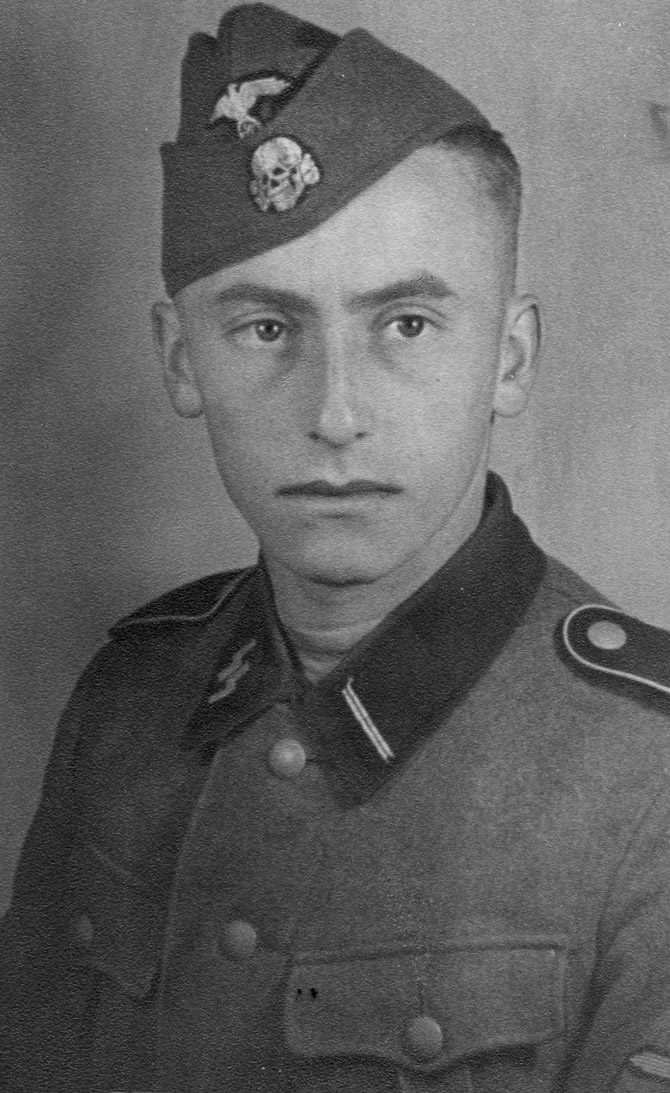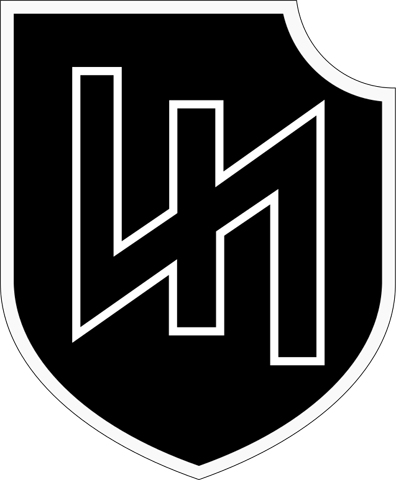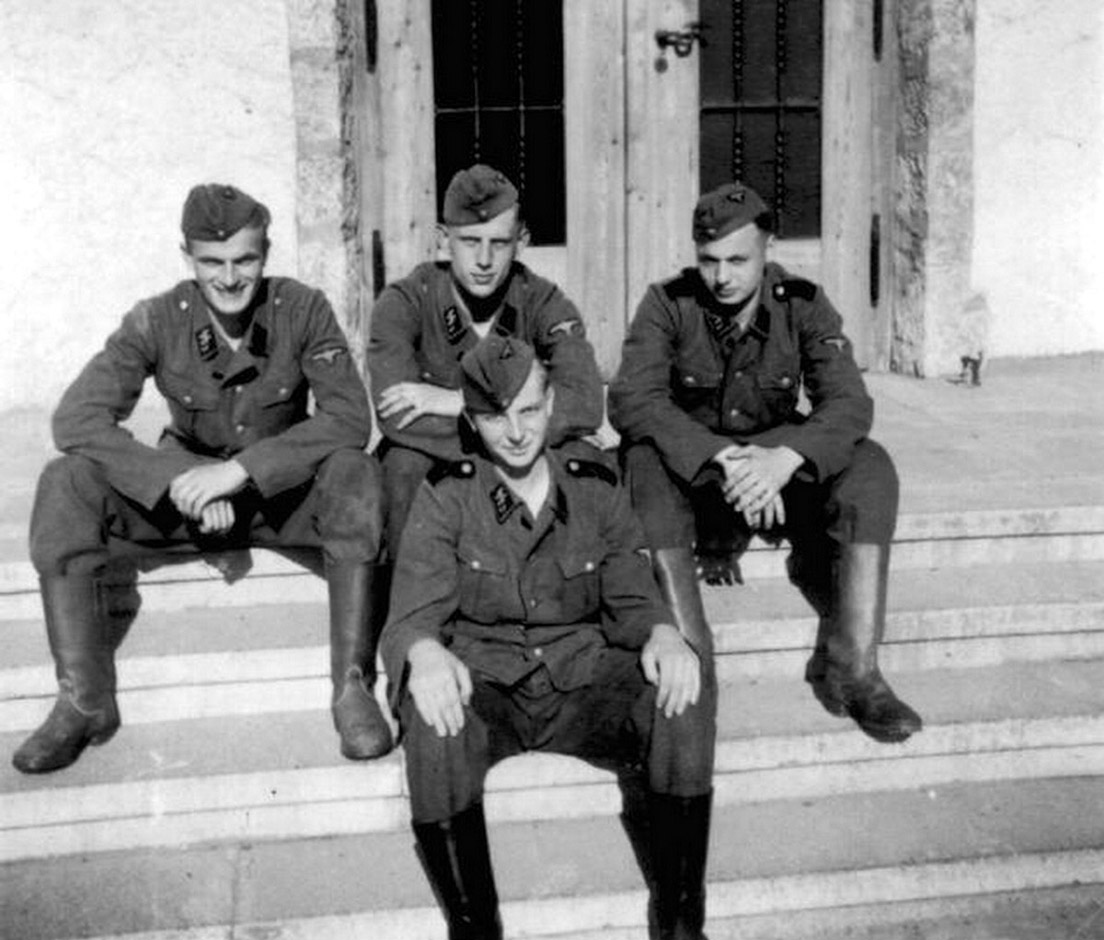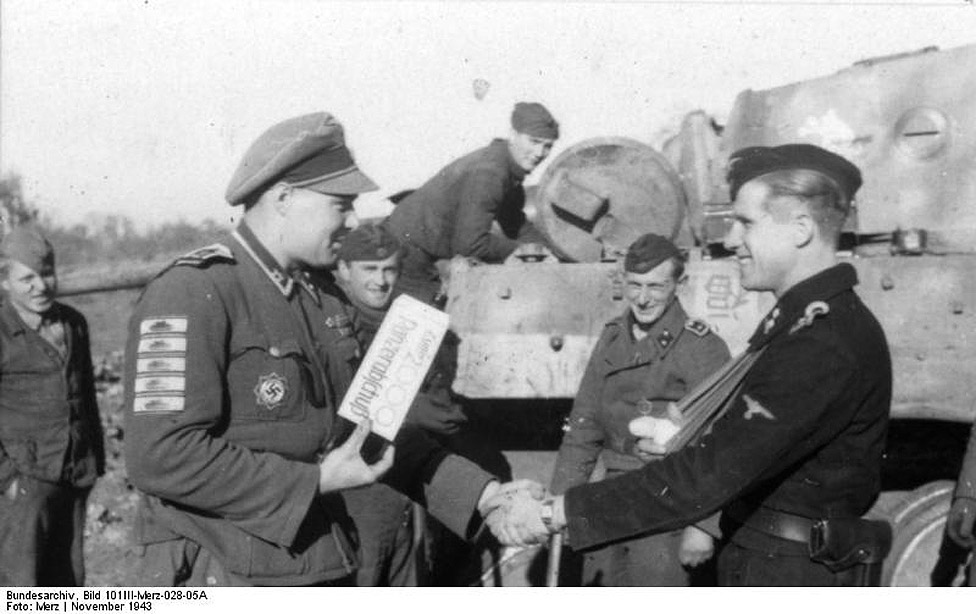
Interview with Konrad (last name withheld due political persecution,) Member of Der Führer Regiment, Das Reich Division, Germany, 1993.
[Above: Konrad, Der Führer Regiment, 1940]


Interview with Konrad (last name withheld due political persecution,) Member of Der Führer Regiment, Das Reich Division, Germany, 1993.
[Above: Konrad, Der Führer Regiment, 1940]

I would like to ask what attracted you to join the SS?
Konrad: It is simple; I was impressed by the meaning of the SS, and how they were seen as an elite guard, much like the old Hussars, or Garde du Corps. In the early days, you had to go through a rigorous exam to be admitted, I believe I was one of 50 out of 500 who applied. It was a proud moment for me.
Did you receive a lot of indoctrination when you enlisted?
Konrad: The SS was a National Socialist organization, we were all loyal to Adolf Hitler, and the ideas of the party were our ideas too. We had many lively discussions about politics, and many had varying views. We did not have political officers like the Soviets, who monitored the reliability of the troops. We debated state policy all the time and what was best for the nation, but we were always respectful of the Fuhrer, and never criticized him.
We were never forced to attend speeches, but sometimes a political leader would come to give a talk about something related to German history or the natural laws of nature that National Socialism is imbued with. One funny topic was an SS race and resettlement person who spoke about responsible breeding, and selecting a proper woman who would give healthy children. He said, “Healthy children ensure a healthy future for the nation and the people who will depend on them, defective children are a burden on those who have to care for them, many being abandoned in the past and dumped onto the state." I thought how horrible that would be. We were 18 and 19 year olds, the last thing we thought about was children, the pretty girls yes, babies no.
Can you describe your training?
Konrad: Yes, it was much like any other military force, we were up by 5 a.m., sometimes 6 a.m. for formation which was quite fast. We had to rise and be in formation in less than 2 minutes. After being out of breath then we had to do various motion exercises and stretches to lube our joints. Then we would run for 3 km or longer depending on how everyone did. We learned to be brothers, and depend on your comrades; this helped us in trying times.
We had a Spiess (German military slang for the Company sergeant major) like the army, and he was always hard on us. However in the SS you were all equal. He wanted us to know that he put his pants on like us, but that he could punch harder than we could and he was burly. I believe he was a former boxer. Woe to him who failed an inspection, I once had to clean all the boots of my platoon because I had a spot of dirt on mine.
My training only got harder. I was assigned to a pioneer platoon and sent to Holland for additional training on bridge building, demolitions, bunker busting, and road building. I will add that while in Holland we helped repair damage caused by our invasion. The civilians were very friendly considering we were uninvited guests. We worked with army pioneer units repairing bridges, roads, and structures. Rotterdam was hit hard, due to the failure of the bombers to receive a recall message, so we helped there too [Rotterdam was bombed by accident due to a series of bad communications and events. German General Rudolf Schmidt, who had recalled the bombers, was quoted as saying 'My God, this is a catastrophe!'].

What was your feeling in 1939 when war was declared?
Konrad: I was a young man who felt his nation had been unfairly treated by the victors of the first war, so when war was declared I felt like it was a time for us to right the wrongs of Versailles. My family hailed from Prussia but was forced to leave after the war due to Poland getting large areas of German territory, then attacking our borders to grab more land and killing many Germans.
The reason the Freikorps was formed was to fight border attacks by both Polish forces and communists. This is a sad chapter lost to history, as no one seems to know about these battles anymore. This is the whole reason we attacked Poland in 1939, they were still attacking the frontier and killing German farmers. When the Führer said for the first time we are shooting back, he was not lying. I felt a great sense of pride that we beat Poland so quickly, and I wished I could have been a part of it.
We all expected the declaration from Britain and France, but were quite surprised they did not declare war on Russia,
[Germany and Russia attacked Poland simulaneously]
when their reason for war was to protect Poland. I believe they showed their hand, that they really hated the German Reich, and Poland was the excuse to fight us. They understood the Führer was only trying to recover the lands taken from Germany, nothing more, but Poland provoked us by their persecution of the German minority and the border attacks.
Did you ever meet Himmler?
Konrad: Yes, he always seemed to be doing inspections and conferring with his generals. I saw him at the front more than once. I always took pride in wearing my uniform, and during one of his inspections, he stopped and complimented me on how shiny my boots looked and asked where I hailed from. He seemed jovial and not at all standoffish as so many officers could sometimes be, even though the SS frowned upon class status.
You were part of the opening of Barbarossa against Russia?
Konrad: Yes, after training in Holland, Der Führer was sent to Lodz, Poland. We were in an old mansion, and immediately began to fix it up. The townspeople would bring us foodstuff, and we gladly bought everything we could, as our rations sometimes were lacking. There was a pretty Polish girl on a nearby farm, and many of the men always tried to be the chosen ones to go buy eggs and milk. We were saddened to learn she already had a soldier from the Luftwaffe who had asked for her hand.
Rumors swirled about what we were doing in Poland; many believed we were going to go to Africa to help Rommel, some believed we were going to attack Russia. For me, I thought it was pretty clear it was going to be Russia. The Luftwaffe constantly was overhead, I could hear more and more trains, and the troop build up was hard to ignore. I secretly hoped the Russians could not see and hear these things.
The 21st of June we were put on alert, told to turn in but be prepared to move out at dawn. I was awakened early in the morning by the sounds of planes overhead, and later I could hear booming in the distance, it sounded like a thunderstorm, but the skies were clear. We were ordered into formation and told we were attacking Russia to rid the world of Jewish Bolshevism. Our CO told us we were at war with the system, not the people, and we must be careful dealing with the population, as we wanted to be seen as liberators.
As we started moving into Russian territory, I was surprised at the amount of people who came out to wish us well and give us water and food. It gave me a good feeling that we were freeing these people from an evil government. I started to see the first prisoners come in, and was surprised at how equipped they were. We saw vast amounts of supplies and vehicles, along with huge columns of prisoners; I thought, “My God, how many men can they have?”
For the first time the thought crossed my mind that Russia was much larger than the Reich was, and their population was 170 million compared to our 80 million. I thought we might have a hard time winning.

[Above: A group of enlisted SS men from the Der Führer regiment]
Konrad: I saw plenty of that, I was part of an machine gun crew and carried ammo. We supported the infantry when they would attack a Russian position. We often had to defuse mines and booby traps and secure bridges from demolition. The Russians destroyed most of everything they could and they created a lot of suffering for the civilians who had nowhere to live when their homes were burnt down. We worked with the RAD to rebuild areas we were billeted in.
We would advance for a few days and then stop to resupply and rest, then advance again. The Russians rarely made stands, usually just using rear guards to slow us down. It was not until the Stalin line on the true Russian border that we saw real combat, where the Russians made stands in force. It was in this fighting that I was promoted, and received my first wound. Der Führer pushed through the line and took part in constant action as the Russians were now getting organized, after recovering from the initial attacks.
We were slowed down, but kept moving east, the Russians surrendered in droves. For the first time we saw former prisoners being let go, and allowed to help us, we called them Hiwis [the German abbreviation of the word 'Hilfswilliger', or helper].
Rumors were rife that many prisoners were forming armies to fight on our side. Der Führer was part of operation Typhoon, the attack on Moscow; I remember it being very cold. We had our overcoats, but winter clothing was very scarce, we all wrote home asking for garments to keep warm. The home front also responded, and by November we started to see arrivals of donated items. Some looked most outlandish, we joked.
We were worn out by December 1941, but victory seemed right around the corner, Moscow was in sight, the Russians were still retreating and our spirits were high even though we were cold and tired. It was during the Russian counter-attacks, which broke our thin lines and worn out men, that I was hit by shrapnel and removed from the front. I also witnessed a Russian crime at the same time; wounded German soldiers were killed where they lay when Russians overran their lines. I was lucky they were repulsed before they made it to me.
What was your impression of the Russian soldier?
Konrad: My thoughts were they were better equipped than we were, and were prepared for war, where we were not. The PPSH [PPSh-41 is a Soviet submachine gun which was widely used] was a prized possession for us as the MP40 was only for squad leaders usually. We were issued the K98, so if we could get a PPSH it gave us firepower that was more effective. The prisoners I met all seemed friendly, and not many were true communists. Most opposed the regime, but also believed they were fighting for their motherland.
The commissars I had no sympathy for, they ordered many killings and their own men feared them. When we captured them they usually were found guilty of some crime that they committed in our area. We came upon many scenes where they had murdered civilians simply for being friendly to German forces. You can understand that when captured, they had an unpleasant fate, and many of them were Jews.
Did you see any persecution or murder of Jews?
Konrad: No, I only saw the results of hanged partisans or executed war criminals. We certainly heard about the pogroms in the Baltic States, and Ukraine where Jews were killed after the Russians fled. It was said the Jews aided the Russians in rounding up Christians to be deported, so the people took revenge when we invaded. We knew Jews were being moved to ghettos but I never saw this. We did not hear anything about the plight of Jews until after the war, when the Allies forced us to watch their propaganda movies. If you refused to believe what they said, they sent you to a camp for a longer sentence.

[Above: Der Führer regiment cuff title]
When did you realize the war was lost?
Konrad: I would have to say it was during the Normandy campaign, I was awestruck at the amount of men and material the Allies could put in the field. They owned the skies and the seas and any attack we made was easily repulsed by vast amounts of artillery fire. I believed we had a chance on the east front, even though Russia outnumbered us greatly; we still seemed to be able to hold them at bay for a time.
The destruction I was seeing in German cities told me the Luftwaffe could not stop the Allies and it was only a matter of time before all was lost. It was hard to ignore, but the people and soldiers knew we had to keep trying, hoping perhaps new weapons would change the tide, or the Allies would come to their senses.
Did you ever have to deal with partisans?
Konrad: Very rarely did Das Reich have to deal with them on the east front. We were a front line combat unit, and the partisans always attacked the rear, which was not defended. I was wounded after Kursk, pretty badly in my leg, and while on a hospital train we were attacked. They stopped the train, broke into a car, shot wounded soldiers and killed the nurses. We were saved by the timely arrival of a partisan-hunting unit of Ukrainians I was told.
The train had a lot of damage from the bandits shooting indiscriminately into well-marked Red Cross cars. There were several dead and wounded. I remember soldiers being upset due to one of the bandits, who was wounded, being brought on board and treated. An SD officer came on board at the next stop and had him removed, there were cheers and claps.
What was the end like for you?
Konrad: After a very long recuperation, and dealing with my father passing, I was sent to a training school and offered a promotion and an invitation to attend officer school. I wanted to get back with my comrades, and was itching to fight, so I requested to be sent back to the front, which meant no promotion or officer school, but I was okay with that.
I came to Normandy in July, fighting was well under way. Immediately I was introduced to Allied air power, our flak was very busy. Planes would attack and strafe anything moving. Many French civilians fell victim to this reckless way of attacking. I saw a farmer's cart shot to pieces and he and his son lay by the side of the road. Das Reich’s flak unit shot down a P47 and the next day a Typhoon. I went to look at them, as they were close by. I felt a strange sense of vengeance.
I was amazed by how fair the Normandy countryside was, and how many civilians were still in the battle area. They took some very heavy losses due to Allied bombings and strafing. Today we are accused of these deaths and labeled as war crimes committed by the SS.
It was during our retreat in August that Das Reich was broken and it was every man for himself. There was a race to get out of what is now called the Falaise pocket. The English had launched a hard attack on our lines, and I found myself lost and in what was now enemy territory. I was low on ammo, had no food, and frankly lost my will to fight, as I wanted to make sure I lived to take care of my mother.
I stumbled upon an English patrol that had a medic, so I surrendered to them, hoping for fair treatment. At first, they were quite rough, going through my uniform, and when I protested I was punched. As they brought me back to their HQ the treatment got much better. They sent me to England, which was actually quite agreeable with me. Many Englishmen seemed sad we had to fight each other and were amazed I felt the same way. I told them often the last thing we ever wanted was to fight another war with our English cousins. For me the war was over, I had fought a good fight and with honor. I am angered that the SS is looked upon as a criminal organization, we were soldiers, we fought because our nation needed us and I have no regrets.

[Above: Oberscharführer Adolf Peichl congratulates SS-Hauptscharführer Hans Soretz for the 2000nd tank destroyed by the Das Reich division, November 1943]